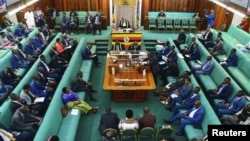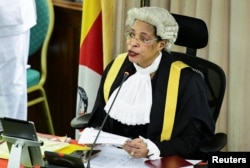Ugandan lawmakers began a new session Thursday, and lawmakers introduced an anti-homosexuality bill that would allow the jailing of LGBTQ individuals for up to 10 years for declaring their identity or touching with homosexual intention.
The text of the bill says it "seeks to protect the cherished culture of the people of Uganda" and its traditional family values against "the acts of sexual rights activists seeking to impose their values of sexual promiscuity on the people of Uganda."
Anita Among, Uganda's parliament speaker, stated reasons why the country needs the law.
"For us it's about our morals and our culture. And I want to urge members of parliament, please don't get intimidated. Never get intimidated, we are doing all of this for humanity," Among said.
Legislator Asuman Basalirwa read the goals of the bill: "Criminalization of homosexuality, with a liability of imprisonment of two to ten years, for committing homosexuality, aggravated homosexuality, attempted homosexuality, aiding and abetting homosexuality, conspiracy to commit homosexuality and related practices."
In 2019, Eric Ndawula, the executive director of the Lifeline Youth Empowerment Center, a gay, bisexual and queer men's organization, was outed after a police raid at a shelter.
Speaking to VOA, Ndawula said his family described him as abnormal and a disgrace to society, forcing him to live a double life. Since then, he said, he has lived as a gay man in Uganda through resilience and being rebellious.
Ndawula described the bill as absurd and annoying, but not surprising.
"Our community is lacking some information especially in regards to understanding the nuances that come with being queer, being LGBT," he said. "People don't become gay at 18. Because at the end of the day, when you look at the bill, it's just regulating how we are having sex. The moment that you come out and speak that you're gay, you're reduced to a sexual being."
In a statement after the bill was introduced, rights group Human Rights Watch said that if adopted, the law would violate fundamental rights, including the rights to freedom of expression and association, privacy, equality, and non-discrimination.
Human Rights Watch researcher Oryem Nyeko told VOA that even though the law does not include a death penalty sentence, as was the case in a similar anti-gay act passed in 2013 but later annulled, no one should be sent to prison because they are having consensual sex with an adult.
Nyeko said the criminalization of same-sex conduct in Uganda will continue to have far-reaching impact.
"What we found when the first iteration of the law was passed, you know, people were arbitrarily arrested just because people thought they might be homosexual, they were beaten, they were evicted from their homes, they lost jobs. And organizations said they wouldn't provide them with services that they need for health care. And these are all important considerations because even if they are a minority, they still matter," Nyeko said.
The 2013 anti-homosexuality act was annulled in court for, among other reasons, parliament passing it without a quorum. During the first reading of the 2023 bill, Speaker Among made it clear what will happen when the time comes to take a vote.
"All the members will vote by tally," Among said. "We will call the person and the person will vote. We don't want the technicalities of saying there was no quorum. This is the time you're going to show us whether you are a homo or you're not."
The bill has been sent to the legal and parliamentary affairs committee, which will hold public hearings.






